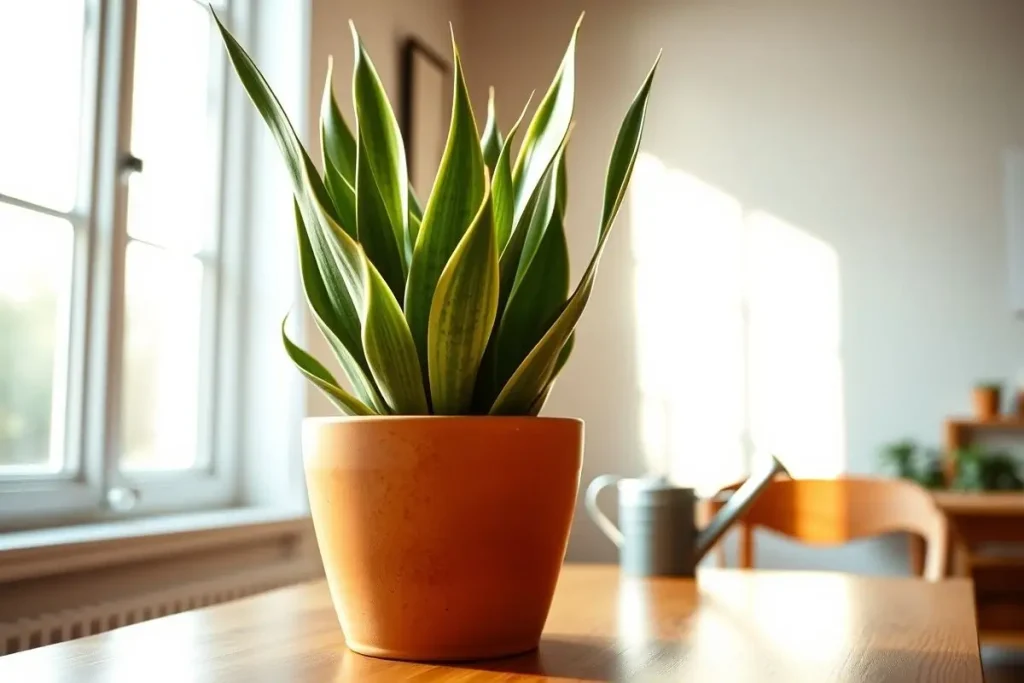Snake plants (Sansevieria) are tough and easy to care for, but did you know they still need special nutrients to grow strong? Just like us, they need the right food to stay healthy!
Want to know what your snake plant needs to thrive and look its best?
Let’s dive into the key nutrients your plant craves, and how you can give them just what they need to flourish.

Why Nutrients Are Important for Snake Plants
Snake plants rely on nutrients for growth, health, and resilience. Nutrients are divided into two key categories:
Macronutrients
Vital for growth and development. Key macronutrients include:
- Nitrogen (N): Encourages lush, green leaves.
- Phosphorus (P): Builds strong roots and supports occasional flowering.
- Potassium (K): Strengthens plant tissue and boosts resistance to stress and disease.
Micronutrients
Needed in smaller amounts but equally essential. Examples include magnesium, calcium, and iron.
Together, these nutrients allow snake plants to photosynthesize, grow vibrant leaves, and maintain strong roots.
My snake plants grow noticeably faster and stay vibrant with balanced fertilizer. Skipping it for months caused browning tips, proving how vital proper nutrients are!
Signs of Nutrient Deficiency in Snake Plants
Not sure if your plant needs extra care? Look for these common signs:
- Yellow Leaves: Indicates low nitrogen.
- Brown Tips: Often caused by potassium imbalance.
- Slow Growth: May suggest a phosphorus deficiency.
If your snake plant shows any of these symptoms, it might need a nutrient boost.
Essential Nutrients for Snake Plants
Key Macronutrients
- Nitrogen (N): Helps leaves stay green and healthy. Without enough, leaves may look pale or yellow. Learn more in: Why Is My Snake Plant Turning Yellow?
- Phosphorus (P): Essential for strong roots and occasional blooms. It supports the plant’s structure even if flowers don’t appear indoors.
- Potassium (K): Strengthens plant tissues and improves water regulation, making the plant more resilient.
Vital Micronutrients
- Magnesium: Supports photosynthesis by helping chlorophyll production.
- Calcium: Strengthens plant structure and cell walls.
- Iron and Zinc: Help with enzyme production and nutrient absorption.
A simple trick I use is to mix crushed eggshells into the soil while repotting. It’s an easy way to add calcium and improve overall soil quality.
How to Provide Nutrients to Snake Plants
Choosing the Right Fertilizer
The easiest way to provide nutrients is through fertilizer. Snake plants thrive with a balanced fertilizer, ideally with an NPK ratio of 10-10-10 or 10-15-10.
Organic vs. Synthetic Fertilizers
- Organic Fertilizers: Compost and worm castings release nutrients slowly and are eco-friendly.
- Synthetic Fertilizers: Act faster but require careful application to avoid over-fertilization.
Natural Feeding Methods
Prefer natural solutions? Try these:
- Coffee Grounds: Add nitrogen but use sparingly to avoid pH issues.
- Banana Peels: Chop and mix into the soil for a potassium boost.
- Compost Tea: Steep compost in water to create a nutrient-rich liquid.
When and How to Fertilize
- Spring and Summer: Feed monthly during active growth.
- Fall and Winter: Skip fertilizer as growth slows.
Learn more about watering frequency in: How Often to Water Snake Plant.
I always dilute liquid fertilizers to half strength to avoid burning the roots. It’s a small adjustment that makes a big difference in plant health.
Common Mistakes in Feeding Snake Plants
Over-Fertilizing
Excess fertilizer can harm roots and cause salt buildup. Flush the soil every few months to remove extra salts.
Using the Wrong Fertilizer
Avoid formulas with high salts or unbalanced NPK ratios. Stick to balanced, low-strength options for best results.
FAQs on Snake Plant Nutrition
What are the best nutrients for snake plants?
Snake plants need Nitrogen, Phosphorus, and Potassium for growth, and Magnesium, Calcium, Iron, and Zinc for health.
Are coffee grounds good for snake plants?
Yes, but use them sparingly. Coffee grounds add nitrogen but can make the soil too acidic if overused.
What happens if I don’t fertilize my snake plant?
Without fertilization, snake plants can survive but may grow slowly and show signs of nutrient deficiency.
How often should I repot a snake plant?
Repot every 2–3 years to refresh the soil and provide more room for roots to grow.
What is the best fertilizer for snake plants?
Use a balanced liquid fertilizer with an NPK ratio of 10-10-10 or 20-20-20 diluted to half strength.
Wrapping Up
Caring for a snake plant is simple once you know its nutritional needs. Providing macronutrients like nitrogen, phosphorus, and potassium, plus essential micronutrients, keeps your plant healthy.
In my experience, balanced nutrients lead to stronger, more vibrant plants. Avoid over-fertilizing, use balanced formulas, and watch for deficiency signs to ensure your snake plant thrives.
Want to give your plants the best care they deserve? Check out our detailed guide on How to Fertilize a Snake Plant!
Resources
- The Quantitative Mineral Nutrient Requirements of Plants by Paul Macy. Read the full study on PubMed.






